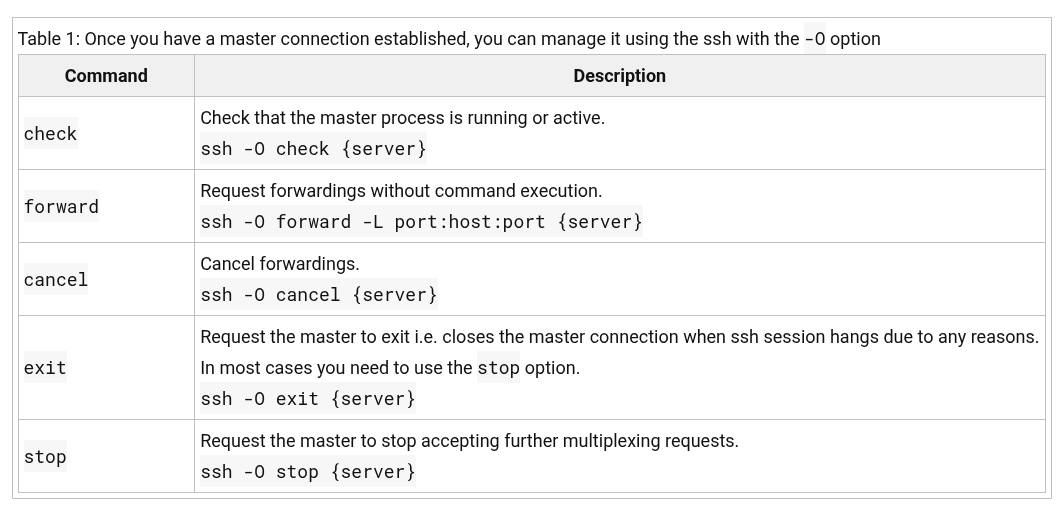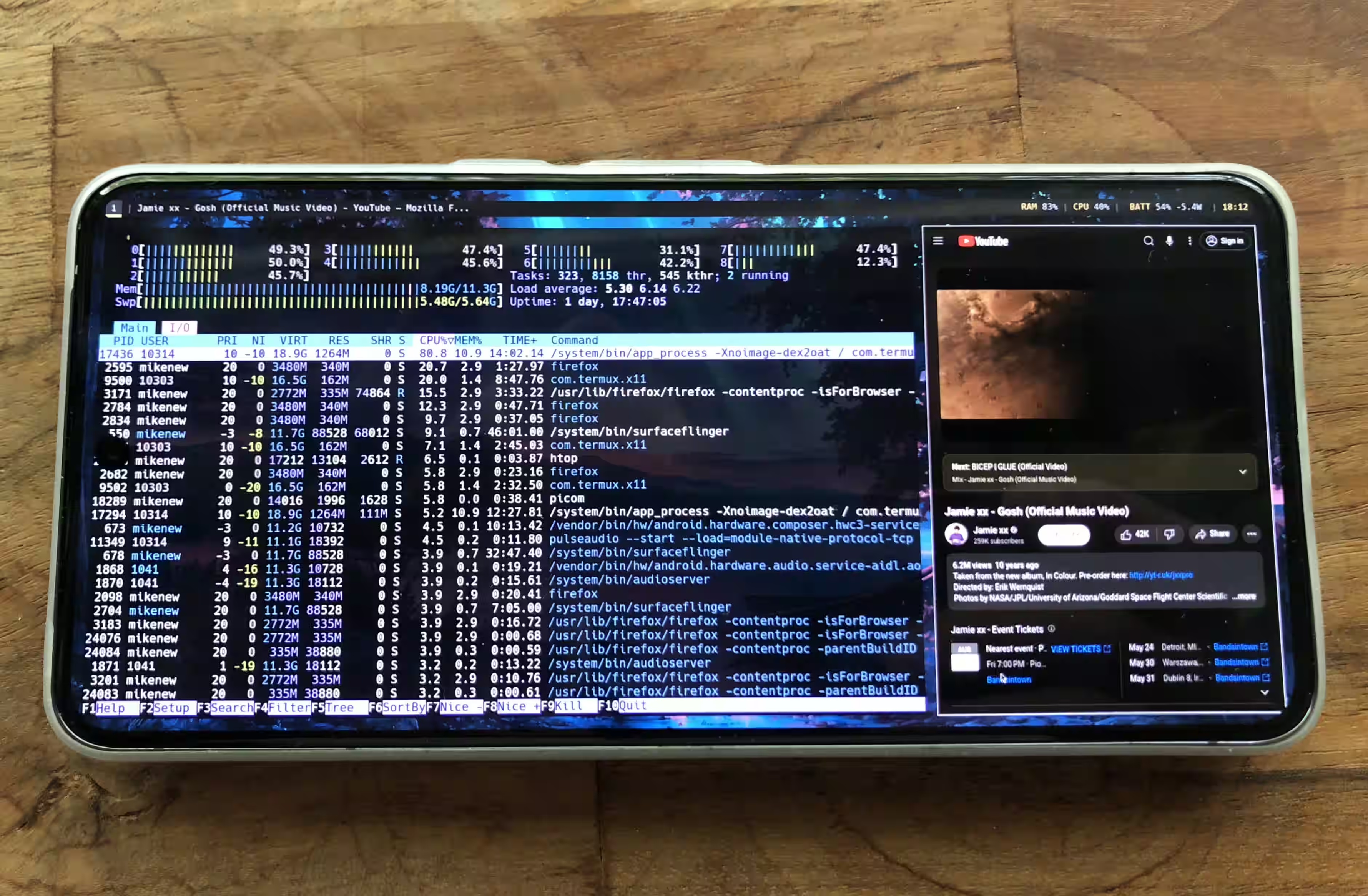Search results for tag #linux
Latest 𝗩𝗮𝗹𝘂𝗮𝗯𝗹𝗲 𝗡𝗲𝘄𝘀 - 𝟮𝟬𝟮𝟱/𝟬𝟱/𝟭𝟵 (Valuable News - 2025/05/19) available.
https://vermaden.wordpress.com/2025/05/19/valuable-news-2025-05-19/
Past releases: https://vermaden.wordpress.com/news/
#verblog #vernews #news #bsd #freebsd #openbsd #netbsd #linux #unix #zfs #opnsense #ghostbsd #solaris #vermadenday
Can't stand those people who insist on telling you every single detail of their day, no matter how boring or repetitive.
Stupid #linux log files.
Multiplexing will boost your SSH connectivity or speed by reusing existing TCP connections to a remote host. Here are commands that you can use to control multiplexing when using OpenSSH server or client on your Linux, macOS, FreeBSD or Unix-like systems. Not sure what SSH multiplexing is? Learn how to set it up and use it to speed up your SSH sessions with our handy guide: https://www.cyberciti.biz/faq/ssh-multiplexing-control-command-to-check-forward-list-cancel-stop-connections/
Here is how coding without a laptop looks - Two weeks with AR glasses and #Linux on Android https://holdtherobot.com/blog/2025/05/11/linux-on-android-with-ar-glasses/
A wild #blog post appears!
I revived pkgsrc on AIX.
(Yes, I already sent a PR to NetBSD.)
https://briancallahan.net/blog/20250516.html
#linux #unix #bsd #freebsd #openbsd #netbsd #dragonflybsd #aix #ibm #solairs #illumos #pkgsrc #opensource #freesoftware

 boosted
boostedLinux containers (OCI Containers) are ephemeral by design, except the volumes, you mount into them. In large scale environments, that can be useful (cattle vs pets argument). But that also introduces new challenges and makes it more complex to manage them.
For my personal environments, I like the approach of FreeBSD jails more. They are just a directory (or ZFS Dataset) with their own, persistent copy of the OS, easy to manage and the networking capabilities are flexible (bridged, vnet, they can be routed, firewalled, etc).
Jails are well aged, are around since FreeBSD 4 back in 2000, the non-ephemeral approach (and the absence of overlay file systems etc) makes them more feel like individual virtual servers than modern Linux containers but with extreme levels of flexibility.
Tools like jmore(8) (by @vermaden) and Bastille (Jails “Templates”) makes them even easier to manage.
I use Jails with Ansible to automate their creation, their lifecycle management and automation of the jailed applications and I highly enjoy, how comfortable and easy it is.
No immutable images, no “Dockerfiles”, no weird volume mounts or image registries and no constant re-creation of images and new deployments just to update something. Just some simple, well isolated operating systems to run my applications in 🙂
I don’t say that Linux containers are bad. There’s for sure situations, where they shine. Just for my personal use-case, they are more effort in comparison to BSD jails and I’m a fan of “using the right tool for a task”
And the idempotent nature of Ansible automation makes it easy to describe them in a declarative way and manage them at scale.
vnStat is a console-based network traffic monitor for Linux/BSD/UNIX, logging usage hourly, daily, and monthly on the server or router
* Linux installation
https://www.cyberciti.biz/faq/ubuntu-install-vnstat-console-network-traffic-monitor/ or https://www.cyberciti.biz/faq/centos-redhat-fedora-linux-install-vnstat-bandwidth-monitor/
* FreeBSD installation https://www.cyberciti.biz/faq/freebsd-install-vnstat-network-traffic-monitor-software/
(free link) https://lwn.net/SubscriberLink/1017705/ca0af831379ca794/
From servers in a data center to desktop computers, many devices communicating on a network will eventually have to filter traffic, whether for security or performance reasons. Bpfilter is a project that allows packet filtering to be done with BPF, which can be faster than other mechanisms. Even small performance improvements in this area can lead to significant gains.
More #linux shenanigans...
You know how for ages, Unix systems let you specify which editor other tools should invoke via the $EDITOR and/or $VISUAL environment variables, falling back to a very sensible vi(1) (or even ed(1)).
The value of that environment variable is used by e.g., pw_edit(3) from vipw(8), notably via execvp(3), so e.g., 'EDITOR="cmd; vi"; vipw' does _not_ lead to the execution of 'cmd'.
Makes sense, right?
To clear the terminal after logging out, here is a method that works in all modern shells (I'm using `ksh`).
Add to `~/.profile`:
test -f $HOME/.exitrc && trap ". $HOME/.exitrc" EXIT
Create `~/.exitrc` with:
type clear >/dev/null 2>&1 && clear
Useful!
Google Chrome was not following the notification spec on Linux for years. This went unnoticed by most of users as services worked it around to accommodate Chrome.
@dnkl took the stand with his notification service that notifications from Chrome wouldn’t work until they followed the spec. After a few years this led to Chrome getting patched to follow the spec.
#opensource #linux https://social.treehouse.systems/@dnkl/114506343509370120
I've been talking about it for months, but I finally followed Jami Kettunen's instructions and got Chimera Linux installed in my Yoga Slim 7x ARM laptop.
Windows was crashing every few days (while unattended) with the error "The system has rebooted without cleanly shutting down first. This error is caused because the system stopped responding and the hardware watchdog triggered a system reset." even after a full restore.
I'm hoping Linux is more stable.
Nobara Linux 42 released as a rolling release with Brave as new default browser, new in-house flatpak store called Flatpost, updated driver manager, GNOME 48, KDE Plasma 6.3.4, Mesa 25.1 and Linux Kernel 6.14.6
Here is a quick useful tip for developers and sysadmins/devops folks. Install `dnf-automatic` package on your RHEL/CentOS/Rocky/Oracle/Fedora or Alma #Linux to automate updates and patching:
sudo dnf install dnf-automatic
sudo systemctl enable --now dnf-automatic.timer
This simple tip can help you manage your packages more efficiently and keep your system up-to-date with less manual intervention, which is especially useful when you are on holidays. See https://www.cyberciti.biz/faq/install-enable-automatic-updates-rhel-centos-8/
Pffft *spits coffee all over keyboard*
So apparently on #Linux, usernames starting with "0x" are interpreted as hex numbers under certain circumstances. 🤪 That seems like asking for trouble...
Heads up: Multiple Security Issues in GNU Screen - mostly affecting release
5.0.0 and setuid-root installations (Local Root Exploit and others) https://www.openwall.com/lists/oss-security/2025/05/12/1
My #Linux journey began over 20 years ago with this book. It will forever be in my collection. This weekend I was flipping through it - wow, what a great book. It's also crazy how much Linux has grown over the years. As much as I reminice over those old days, I definitely do not miss manually configuring my xfree86 config file! 🤣
You can quickly toggle between your two most recent directories with ‘cd -‘:
If you find yourself frequently jumping back and forth between two directories, stop typing out long paths repeatedly! Simply use the command:
cd -
This command will take you to the directory you were in just before your current one. Executing it again will take you back. It saves me a lot of typing and time so give it a try 😌
Linux removes support for the 486, and now I’m curious what that means for Vortex86 processors
I had to dig through our extensive archive - OSNews was founded in 2007, after all - to see if we reported on it at the time, but it turns out we didn't: in 2006, Intel announced that in 2007, it would cease production of a range of old chips, includi
Our household living room computer runs Debian 12 and KDE and we each have our own sessions and use CTRL-ATL-F7 CTRL-ATL-F8 ... to switch between sessions.
Generally it works really well, but every so often, a Plasma process consumes all the RAM causing the PC to lock up. Sometimes it recovers, but the fastest thing to do is a hard reboot.
Any suggestions how I might find out what is going on and how to fix? The PC is usually so nailed, that is it is not possible to run any commands.
#Linux
#Debian
#KDE
Realize the following; **you** are in control of the fun you have when you are computing.
The only way you can guarantee that is by running an Open Source Operating System on that device.
If you happen to be in a closed Source operating system with an open source kernel {Android} there are ways to dechain yourself fully
They will probably be hard or painful but they are worth the effort.
If it seems to be too hard, plan your next device to be one that is designed to run with an open source operating system especially if you are going to buy your next Android.
First check if your device is supported by an open source operating system, fully supported!, then you buy it.
Make sure that the grip of the closed Source operating system underlords on you is released Free yourself






![Terminal output highlighting how username 0x3E8 maps to uid 1000 when passed to the ps(1) command:
jschauma@ubuntu:~$ id
uid=1000(jschauma) gid=1000(jschauma) groups=1000(jschauma),27(sudo)
jschauma@ubuntu:~$ id 0x3E8
uid=1002(0x3E8) gid=1002(0x3E8) groups=1002(0x3E8)
jschauma@ubuntu:~$ id 0x0
uid=1001(0x0) gid=1001(0x0) groups=1001(0x0)
jschauma@ubuntu:~$ sudo -u 0x3E8 sleep 600 &
[1] 1384
jschauma@ubuntu:~$ ps -o pid,uid,cmd -u 0x3E8
PID UID CMD
868 1000 /usr/lib/systemd/systemd --user
869 1000 (sd-pam)
953 1000 sshd: jschauma@pts/0
957 1000 -bash
1365 1000 sshd: jschauma@pts/1
1366 1000 -bash
1387 1000 ps -o pid,uid,cmd -u 0x3E8
jschauma@ubuntu:~$ ps -ax -o pid,uid,cmd | grep [s]leep
1384 0 sudo -u 0x3E8 sleep 600
1385 0 sudo -u 0x3E8 sleep 600
1386 1002 sleep 600
jschauma@ubuntu:~$ ps -o pid,uid,cmd -u 0x0
PID UID CMD
1 0 /sbin/init
2 0 [kthreadd]
3 0 [pool_workqueue_release]
4 0 [kworker/R-rcu_g]
5 0 [kworker/R-rcu_p]
6 0 [kworker/R-slub_]
7 0 [kworker/R-netns]
8 0 [kworker/0:0-cgroup_destroy]
9 0 [kworker/0:1-events]
Terminal output highlighting how username 0x3E8 maps to uid 1000 when passed to the ps(1) command:
jschauma@ubuntu:~$ id
uid=1000(jschauma) gid=1000(jschauma) groups=1000(jschauma),27(sudo)
jschauma@ubuntu:~$ id 0x3E8
uid=1002(0x3E8) gid=1002(0x3E8) groups=1002(0x3E8)
jschauma@ubuntu:~$ id 0x0
uid=1001(0x0) gid=1001(0x0) groups=1001(0x0)
jschauma@ubuntu:~$ sudo -u 0x3E8 sleep 600 &
[1] 1384
jschauma@ubuntu:~$ ps -o pid,uid,cmd -u 0x3E8
PID UID CMD
868 1000 /usr/lib/systemd/systemd --user
869 1000 (sd-pam)
953 1000 sshd: jschauma@pts/0
957 1000 -bash
1365 1000 sshd: jschauma@pts/1
1366 1000 -bash
1387 1000 ps -o pid,uid,cmd -u 0x3E8
jschauma@ubuntu:~$ ps -ax -o pid,uid,cmd | grep [s]leep
1384 0 sudo -u 0x3E8 sleep 600
1385 0 sudo -u 0x3E8 sleep 600
1386 1002 sleep 600
jschauma@ubuntu:~$ ps -o pid,uid,cmd -u 0x0
PID UID CMD
1 0 /sbin/init
2 0 [kthreadd]
3 0 [pool_workqueue_release]
4 0 [kworker/R-rcu_g]
5 0 [kworker/R-rcu_p]
6 0 [kworker/R-slub_]
7 0 [kworker/R-netns]
8 0 [kworker/0:0-cgroup_destroy]
9 0 [kworker/0:1-events]](https://media.mstdn.social/media_attachments/files/114/501/839/068/572/779/original/2e088f061f9c19f0.png)

